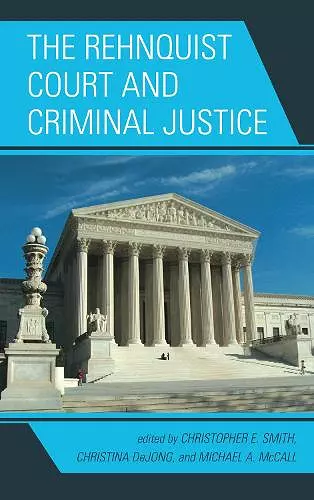The Rehnquist Court and Criminal Justice
Christopher E Smith editor Christina DeJong editor Michael McCall editor
Format:Paperback
Publisher:Bloomsbury Publishing PLC
Published:15th Jun '13
Currently unavailable, and unfortunately no date known when it will be back

This book examines the criminal justice decisions of the Rehnquist Court era through analyses of individual justices' contributions to the development of law and policy. The Rehnquist Court era (1986-2005) produced a period of opportunity for the U.S. Supreme Court's judicial conservatives to reshape constitutional law concerning rights in the criminal justice process. It was an era in which the Court produced many hotly-debated decisions concerning such issues as capital punishment, search and seizure, police interrogations, and prisoners' rights. The Court's most conservative justice, William H. Rehnquist, ascended to the key leadership position of Chief Justice and he was joined on the Court by two new appointees, Antonin Scalia and Clarence Thomas, who were equally supportive of both greater authority for police and limited definitions of constitutional rights for suspects, defendants, and criminal offenders. The Rehnquist Court era decisions refined and narrowed many of the rights-expanding decisions of the Warren Court era (1953-1969). However, the Supreme Court did not ultimately eliminate the Warren era's foundational rights concepts in criminal justice, such as the exclusionary rule and Miranda warnings. As the leading liberal voices of the Warren era, William Brennan and Thurgood Marshall, retired early in the Rehnquist era, the Court experienced continued advocacy of broad conceptions for many rights through the increased assertiveness of Republican appointees Harry Blackmun, John Paul Stevens, and David Souter as well as the arrival of new Democratic appointees Ruth Bader Ginsburg and Stephen Breyer. In many important cases, the justices advocating the preservation of constitutional protections could prevail, even on a generally conservative Court, by persuading one or more of President Ronald Reagan's appointees to support a particular right for suspects and defendants. Sandra Day O'Connor and Anthony Kennedy, in particular, shaped outcomes within a divided Court as they determined which of the Court’s wings with which they would align in a particular case. The contributors to this volume identify and highlight the unique perspectives and influential decisions of individual justices as the means for understanding the Rehnquist Court’s imprint on criminal justice.
Smith and DeJong (both, criminal justice, Michigan State Univ.) and McCall (sociology, San Diego State Univ.) have assembled a collection of essays that examine the criminal justice votes and jurisprudence of each justice who served on the US Supreme Court during the period that William H. Rehnquist served as chief justice (except Justice Lewis Powell, who served only one term after Rehnquist's promotion to chief justice). However, the chapters do more than simply examine each justice's votes in criminal cases. Drawing almost exclusively from secondary sources, the contributors provide brief biographies and descriptions of the justices' experiences and judicial records (where applicable) before Rehnquist was elevated to chief justice. Smith and McCall provide an introduction that nicely summarizes general trends in the criminal justice docket of the Supreme Court during the period under examination. McCall's chapter on Rehnquist describes him as successful and well liked by the other justices and argues that he was generally successful in moving the court's criminal justice jurisprudence in the conservative direction without being able to overturn some of the key Warren Court precedents that he opposed. Summing Up: Recommended. * Choice Reviews *
The Rehnquist Court and Criminal Justice is the definitive examination of a how William Rehnquist and his Court sought to undo the Warren Court criminal due process revolution. Uniquely focusing on the Rehnquist Court justices, the editors have woven together essays that reveal the tensions, personalities, and forces that remade criminal law from the time of the Burger Court to the War on Terrorism. Richard Nixon would have been so proud of what his Justice accomplished! -- David Schultz, Hamline University
ISBN: 9780739140819
Dimensions: 239mm x 162mm x 28mm
Weight: 653g
334 pages